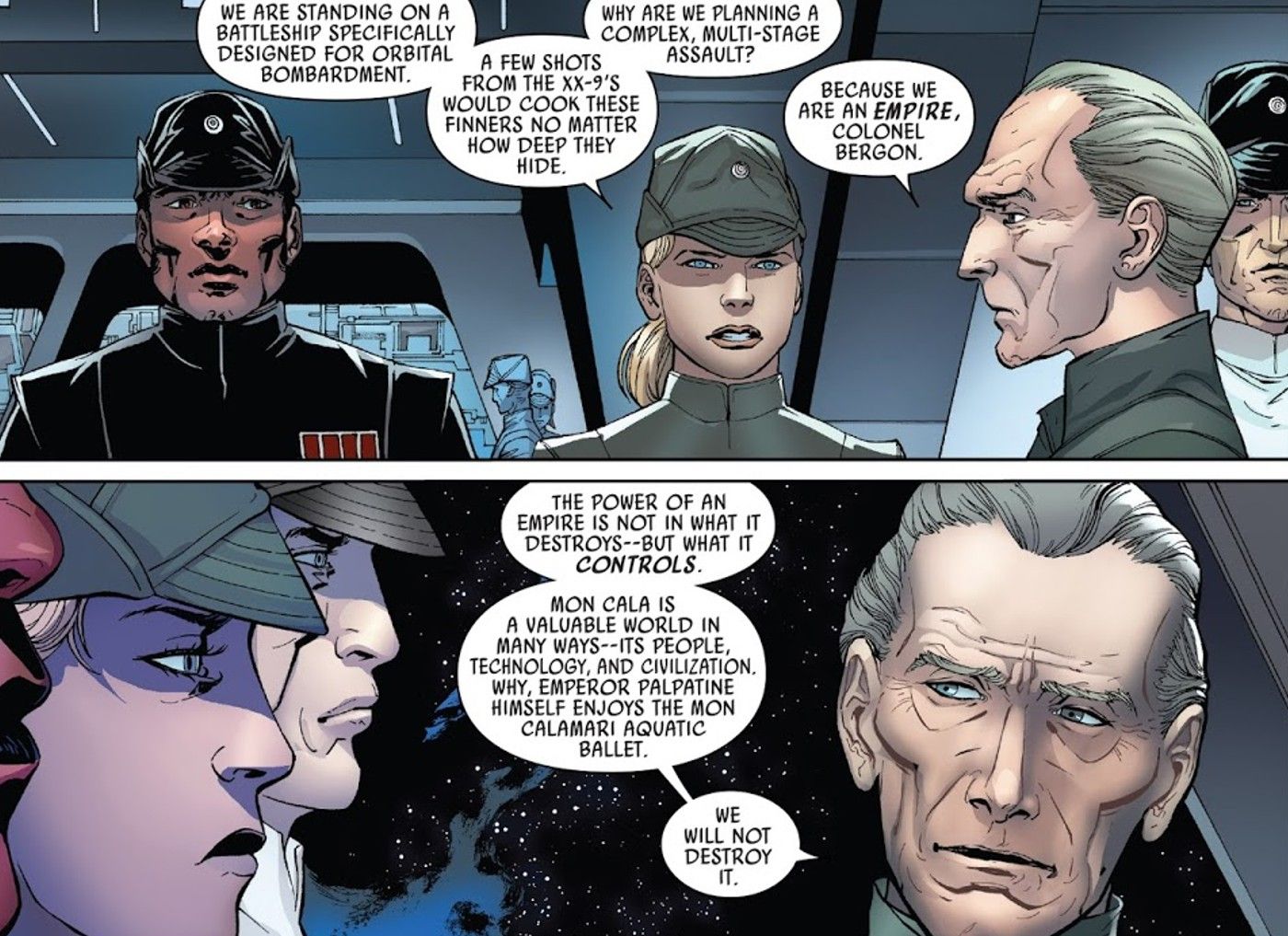While Grand Moff Tarkin chose to destroy Alderaan in A New Hope, this dark act of genocide actually went against his history of refusing to take excessive action against the Empire’s enemies, as revealed in a Star Wars comic. Much earlier in the saga, he exercises a surprising amount of patience and restraint when dealing with a rebellious planet whose inhabitants are actually threatening the Empire’s legitimacy, unlike the Alderaanians years later.
During the early years of the Empire, a great deal of Emperor Palpatine’s energy went towards strengthening his fragile hold on the galaxy and strong-arming those who had the audacity to resist him. The Mon Calamari fell into the latter category, with their leaders unwilling to hand over their planet’s resources for a fraction of their worth. But rather than accept the approved tactic of orbital bombardment, Tarkin creates a highly complex contingency plan, choosing to inconvenience the Empire rather than embrace a disproportionate plan of attack.
The moment comes from 2017’s Darth Vader #13 by writer Charles Soule, artist Giuseppe Camuncoli, inker Daniele Orlandini, colorist David Curiel and letterer Joe Caramagna. Tarkin’s explanation in the comic greatly conflicts with how the Empire operates during A New Hope. He states that empires derive power from what they control, not what they destroy, even going so far as to argue in the rebels’ favor by pointing out that Palpatine personally enjoys the planet’s aquatic ballet. Tarkin reveals that he would only ever authorize the use of deadly force if he had justifiable cause. Sadly, that cause is offered later in the issue, when the Imperial ambassador’s shuttle explodes upon takeoff after another unsuccessful negotiation – an attack orchestrated by the Jedi Barr.

It’s intriguing how much Tarkin’s philosophy shifts years after the Empire’s clash with the Mon Calamari during the time of the Rebel Alliance. Upon the capture of Princess Leia in A New Hope, Tarkin threatens the destruction of her home planet of Alderaan if she fails to give him the location of the Rebellion’s hidden base. Of course, Tarkin decides to destroy Alderaan anyway after she relinquishes what he believes is their location to demonstrate the power of the Death Star and the will of the Empire. What’s even more baffling is that Tarkin even admits that Alderaan is too remote for a proper demonstration and yet he still decides to destroy the planet anyway. It’s a chilling lesson in what representing the Empire did to a man who once went out of his way to prevent needless destruction.
The difference is incredibly stark. While Leia seems to comply with Tarkin’s demands, the Mon Calamari in the Star Wars comics are actively refusing to stay in compliance with the Empire’s terms at a time when Palpatine’s grasp on the galaxy is already fragile. Any sign of defiance actively undermines the Empire and stokes the fires of further rebellion, but Tarkin still decides not to annihilate the Mon Calamari. Something obviously changes from the time Tarkin makes this decision to when he orders the destruction of Alderaan, and that something is the rise of the Rebel Alliance.
There are no indicators in the following issues of 2017’s Darth Vader series that suggest Tarkin changes in that time frame, proving it is likely the Rebel Alliance becoming organized that persuades him to be far more heavy handed in shutting down defiance. While the Tarkin of the past clearly believed that the Mon Calamari could be brought into line peacefully, it seems years of continued rebellion hardened his heart, as the villain failed to realize that as long as hope remained in the galaxy, the Empire would never go unopposed. In A New Hope, Grand Moff Tarkin is a monster of the highest order, but Star Wars comics reveal that in the early days of the Empire, he actually took steps to avoid killing rebels he’d been ordered to pacify.




